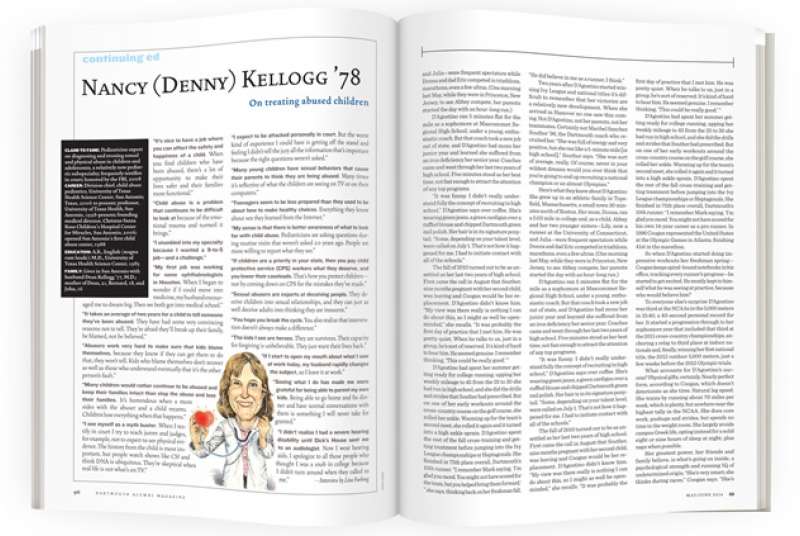
Nancy (Denny) Kellogg ’78
Notable Achievements: Pediatrician expert on diagnosing and treating sexual and physical abuse in children and adolescents, a relatively new pediatric subspecialty; frequently testifies in court; honored by the FBI, 2008
Career: Division chief, child abuse pediatrics, University of Texas Health Science Center, San Antonio, Texas, 2006 to present; professor, University of Texas Health, San Antonio, 1998-present; founding medical director, Christus Santa Rosa Children’s Hospital Center for Miracles, San Antonio, 2006; opened San Antonio’s first child abuse center, 1988
Education: A.B., English (magna cum laude); M.D., University of Texas Health Science Center, 1985
Family: Lives in San Antonio with husband Dean Kellogg ’77, M.D.; mother of Dean, 21, Bernard, 18, and John, 16
“It’s nice to have a job where you can affect the safety and happiness of a child. When you find children who have been abused, there’s a lot of opportunity to make their
lives safer and their families more functional.”
“Child abuse is a problem that continues to be difficult to look at because of the emotional trauma and turmoil it brings.”
“I stumbled into my specialty because I wanted a 9-to-5 job—and a challenge.”
“My first job was working for some ophthalmologists in Houston. When I began to wonder if I could move into medicine, my husband encouraged me to dream big. Then we both got into medical school.”
“It takes an average of two years for a child to tell someone they’ve been abused. They have had some very convincing reasons not to tell. They’re afraid they’ll break up their family, be blamed, not be believed.”
“Abusers work very hard to make sure that kids blame themselves, because they know if they can get them to do that, they won’t tell. Kids who blame themselves don’t recover as well as those who understand eventually that it’s the other person’s fault.”
“Many children would rather continue to be abused and keep their families intact than stop the abuse and lose their families. It’s horrendous when a mom sides with the abuser and a child recants. Children lose everything when that happens.”
“I see myself as a myth buster. When I testify in court I try to teach jurors and judges, for example, not to expect to see physical evidence. The history from the child is most important, but people watch shows like CSI and think DNA is ubiquitous. They’re skeptical when real life is not what’s on TV.”
“I expect to be attacked personally in court. But the worst kind of experience I could have is getting off the stand and feeling I didn’t tell the jury all the information that’s important because the right questions weren’t asked.”
“Many young children have sexual behaviors that cause their parents to think they are being abused. Many times it’s reflective of what the children are seeing on TV or on their computers.”
“Teenagers seem to be less prepared than they used to be about how to make healthy choices. Everything they know about sex they learned from the Internet.”
“My sense is that there is better awareness of what to look for with child abuse. Pediatricians are asking questions during routine visits that weren’t asked 20 years ago. People are more willing to report what they see.”
“If children are a priority in your state, then you pay child protective service (CPS) workers what they deserve, and you lower their caseloads. That’s how you protect children—not by coming down on CPS for the mistakes they’ve made.”
“Sexual abusers are experts at deceiving people. They deceive children into sexual relationships, and they can just as well deceive adults into thinking they are innocent.”
“You hope you break the cycle. You also realize that intervention doesn’t always make a difference.”
“The kids I see are heroes. They are survivors. Their capacity for forgiving is unbelievable. They just want their lives back.”
“If I start to open my mouth about what I saw at work today, my husband rapidly changes the subject, so I leave it at work.”
“Seeing what I do has made me more grateful for being able to parent my own kids. Being able to go home and fix dinner and have normal conversations with them is something I will never take for granted.”
“I didn’t realize I had a severe hearing disability until Dick’s House sent me to an audiologist. Now I wear hearing aids. I apologize to all those people who thought I was a snob in college because I didn’t turn around when they called to me.”










